Stephan Chambers, Marshall Institute Director
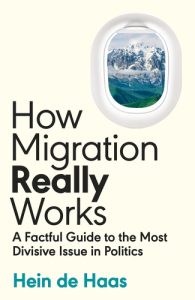 I’ve just finished Hein de Haas’ How Migration Really Works which is a brilliant (and often wildly counterintuitive) book on a topic of real significance. On my bedside table are Dieter Helm’s Legacy: How to Build the Sustainable Economy and Ian Goldin’s Age of the City. The book I’ve learnt most from in the last month is Mary Oliver’s Devotions. And for Christmas I hope to get Lydia Davies’ Our Strangers, Patrick Barhham’s The Swimmer, and Katherine Rundell’s The Golden Mole.
I’ve just finished Hein de Haas’ How Migration Really Works which is a brilliant (and often wildly counterintuitive) book on a topic of real significance. On my bedside table are Dieter Helm’s Legacy: How to Build the Sustainable Economy and Ian Goldin’s Age of the City. The book I’ve learnt most from in the last month is Mary Oliver’s Devotions. And for Christmas I hope to get Lydia Davies’ Our Strangers, Patrick Barhham’s The Swimmer, and Katherine Rundell’s The Golden Mole.
Julian Le Grand, Professor of Social Policy
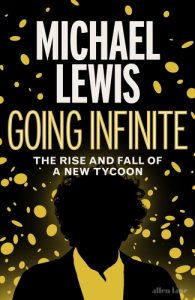 My reading over the past few months has been dominated by three, rather contrasting, accounts of the travails of American capitalism (and capitalists). One is on the central role played by members of the Sackler family and their pharmaceutical companies in the development of the opioid crisis in the US and elsewhere: Empire of Pain: The Secret History of the Sackler Dynasty by Patrick Radden Keefe. The publisher’s blurb describes it as ‘gripping and shocking’ and, for once, the publisher’s blurb is right on the button. Another is Michael Lewis’ account of the rise and fall of the financier and allegedly effective altruist, Sam Bankman-Fried: Going Infinite. An intriguing aspect of the book is the author’s inability to decide whether Bankman-Fried is really a crook or basically a decent man who just made some mistakes (I know what I think). The third is a biography of another extraordinary character, but one who, unlike the others, has real positive achievements to his credit: Elon Musk by Walter Isaacson. Here the question is whether the social benefits of his success in overturning the car and rocket industries outweighs his astonishing bouts of antisocial behaviour, to say nothing of the continued destruction of Twitter (I‘m sorry: X).
My reading over the past few months has been dominated by three, rather contrasting, accounts of the travails of American capitalism (and capitalists). One is on the central role played by members of the Sackler family and their pharmaceutical companies in the development of the opioid crisis in the US and elsewhere: Empire of Pain: The Secret History of the Sackler Dynasty by Patrick Radden Keefe. The publisher’s blurb describes it as ‘gripping and shocking’ and, for once, the publisher’s blurb is right on the button. Another is Michael Lewis’ account of the rise and fall of the financier and allegedly effective altruist, Sam Bankman-Fried: Going Infinite. An intriguing aspect of the book is the author’s inability to decide whether Bankman-Fried is really a crook or basically a decent man who just made some mistakes (I know what I think). The third is a biography of another extraordinary character, but one who, unlike the others, has real positive achievements to his credit: Elon Musk by Walter Isaacson. Here the question is whether the social benefits of his success in overturning the car and rocket industries outweighs his astonishing bouts of antisocial behaviour, to say nothing of the continued destruction of Twitter (I‘m sorry: X).
Amelia Bradley, Head of External Relations
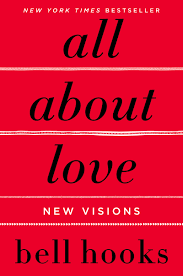 Amidst the heaviness of what is happening in today’s world I have started reading All About Love by bell hooks. It demonstrates how love can heal the wounds we bear as individuals and as nations, for it is the cornerstone of compassion and forgiveness — It’s leaving me feel more hopeful and optimistic for 2024.
Amidst the heaviness of what is happening in today’s world I have started reading All About Love by bell hooks. It demonstrates how love can heal the wounds we bear as individuals and as nations, for it is the cornerstone of compassion and forgiveness — It’s leaving me feel more hopeful and optimistic for 2024.
Anna Townsend, Head of Programme Delivery
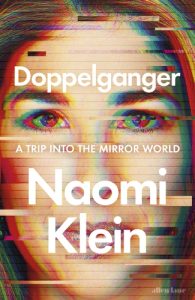 One of the most interesting books I read this year was Naomi Klein’s Doppelganger. The books starts ostensibly as an exploration of the years of (mostly online) confusion between the author and Naomi Wolf but then delves into wider themes around the disorientation of doubles, mirror worlds and shadow lands. The book incorporates the themes of Covid, online branding, big tech, influencers, conspiracy theories, the history of ‘othering’, and the increasingly blurred lines between the left-right political axis around some of these issues. At times it’s a troubling and unnerving read but is fascinating and, in many ways, a comforting explanation of the present situation we find ourselves in.
One of the most interesting books I read this year was Naomi Klein’s Doppelganger. The books starts ostensibly as an exploration of the years of (mostly online) confusion between the author and Naomi Wolf but then delves into wider themes around the disorientation of doubles, mirror worlds and shadow lands. The book incorporates the themes of Covid, online branding, big tech, influencers, conspiracy theories, the history of ‘othering’, and the increasingly blurred lines between the left-right political axis around some of these issues. At times it’s a troubling and unnerving read but is fascinating and, in many ways, a comforting explanation of the present situation we find ourselves in.
Other 2023 highlights include the Hiroshi Sugimoto exhibition at the Hayward Gallery, John Robins’ stand-up show Howl, and, forget Barbenheimer, Past Lives was the best film this year – it’s beautiful, and I highly recommend!
Alex Wright, Programme Delivery Manager
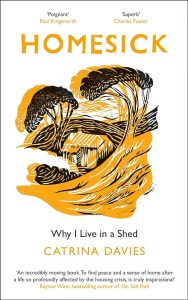 I listened to the audiobook of Homesick: Why I Live in a Shed by Catrina Davies on a recommendation and I am very glad I did. On the one hand, an eye-opening insight into the impact of the housing crisis on rural poverty in the UK, and specifically in Cornwall, this is also a beautifully written love letter to the land and sea. Davies uses her story to paint a deeply personal picture of trying to find balance, stability, and ultimately a home, while shining a light on a system bound not to be able to provide them. Joyous at times, sad at times, worrying with regard precarity of a culture and way of life for so many, but ultimately a touching and thought provoking read.
I listened to the audiobook of Homesick: Why I Live in a Shed by Catrina Davies on a recommendation and I am very glad I did. On the one hand, an eye-opening insight into the impact of the housing crisis on rural poverty in the UK, and specifically in Cornwall, this is also a beautifully written love letter to the land and sea. Davies uses her story to paint a deeply personal picture of trying to find balance, stability, and ultimately a home, while shining a light on a system bound not to be able to provide them. Joyous at times, sad at times, worrying with regard precarity of a culture and way of life for so many, but ultimately a touching and thought provoking read.



